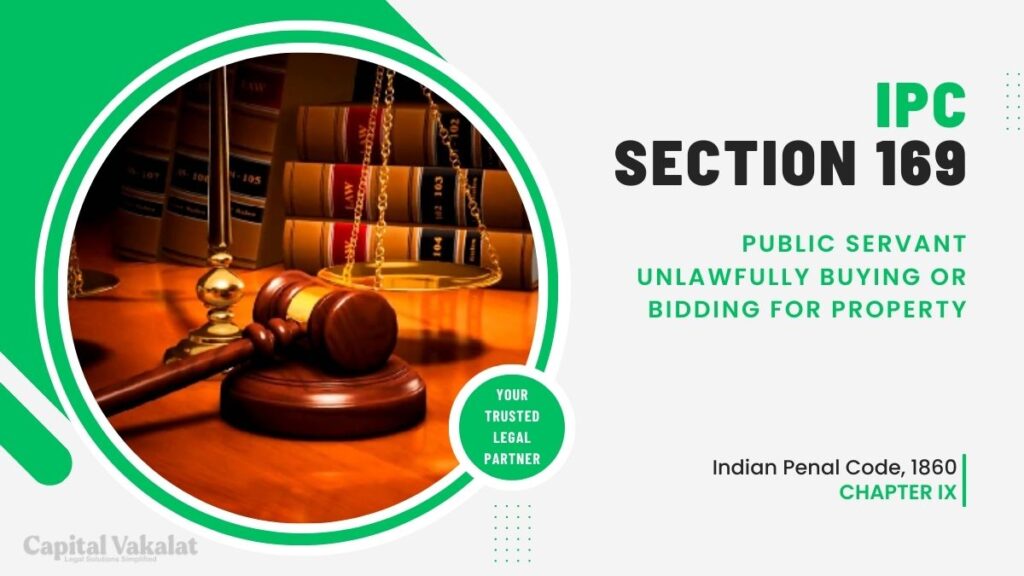In a democratic society, public servants play a vital role in maintaining law and order. They are entrusted with significant powers and responsibilities. However, with power comes the potential for misuse. Section 169 of the Indian Penal Code (IPC) deals with the unlawful buying or bidding for property by public servants.

This article delves into the intricacies of Section 169 IPC, providing a comprehensive understanding of the law and its implications.
Understanding Section 169 IPC
Section 169 of the IPC, nestled within Chapter IX, pertains to the offense of “public servant unlawfully buying or bidding for property.” This provision aims to prevent corruption and unethical practices among public servants by prohibiting them from indulging in activities that could compromise their integrity.
The Legal Framework
To comprehend the gravity of Section 169 IPC, one must first understand the legal framework. The IPC, drafted in 1860, serves as the fundamental criminal code of India. Section 169 is an essential component of this legal framework, designed to ensure ethical conduct among public servants.
Unlawful Acquisition by Public Servants
Section 169 IPC explicitly addresses the actions of public servants in relation to acquiring or bidding for property. It prohibits any public servant from engaging in such activities unless it is conducted in the discharge of their official duties.
Elements of Offense
To be convicted under Section 169 IPC, certain elements must be established. These elements include the accused being a public servant, the act of buying or bidding for property, and the absence of it being part of their official duties.
Penalties and Consequences
The consequences of violating Section 169 IPC can be severe. Those found guilty may face imprisonment, fines, and even dismissal from their public office, depending on the circumstances and the gravity of the offense.
Landmark Cases
Several landmark cases in India’s legal history have brought Section 169 IPC into the limelight. These cases have set precedents for the interpretation and application of this provision.
Defenses and Exceptions
While Section 169 IPC establishes a clear offense, it also allows for certain defenses and exceptions that public servants can use to protect themselves in specific situations.
Importance of the Law
The importance of Section 169 IPC cannot be understated. It serves as a deterrent against corruption and misuse of power within the public service sector, helping to maintain the trust of the citizens in their government.
Preventive Measures
To ensure compliance with Section 169 IPC, it is essential to take preventive measures at both the individual and institutional levels. These measures can help in upholding the sanctity of public service.
Conclusion
In conclusion, Section 169 IPC is a crucial legal provision that upholds the integrity and ethical conduct of public servants. It serves as a safeguard against corruption and unethical practices within the public service sector, contributing to a just and transparent society.
Frequently Asked Questions
Who is a Public Servant?
A public servant is an individual employed in the public sector who holds a position of authority, responsibility, and trust in the government. This includes government officials, bureaucrats, and law enforcement personnel.
What are the Penalties for Violating Section 169 IPC?
The penalties for violating Section 169 IPC can include imprisonment, fines, and even dismissal from public office, depending on the severity of the offense and the circumstances.
Are There Any Defenses Against Section 169 IPC?
Yes, there are certain defenses and exceptions available to public servants. These can be used to protect themselves in specific situations and justify their actions.
How Can We Prevent Unlawful Acquisition?
Preventing unlawful acquisition by public servants requires a combination of ethical training, strong institutional checks, and public awareness. It is essential to maintain a culture of transparency and accountability within the public service sector.